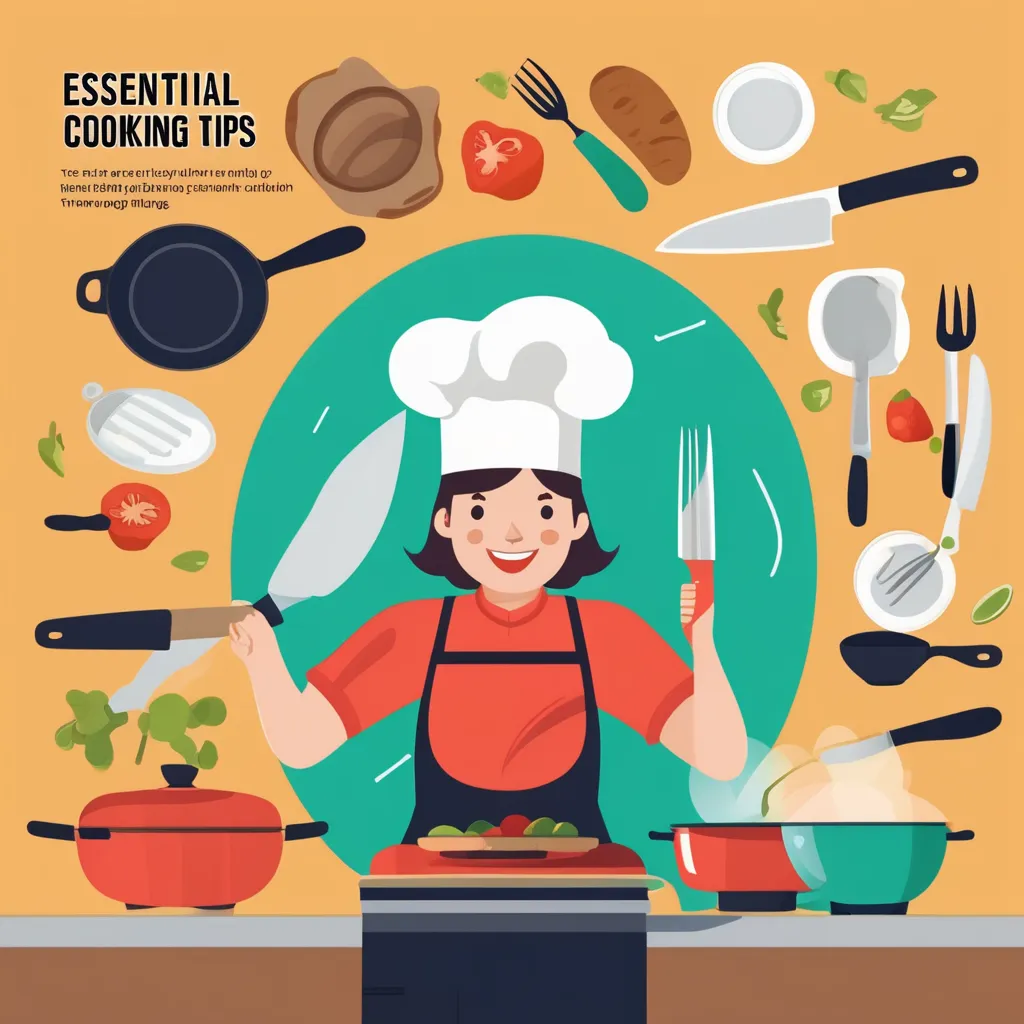Cooking at home can be a delightful and rewarding experience, but it also comes with its own set of challenges. Whether you’re just starting out or looking to refine your skills, having a few essential cooking tips and tricks can make a significant difference in your kitchen adventures. In this blog post, we’ll explore practical kitchen tips, techniques, and shortcuts that can help make cooking easier, more enjoyable, and more efficient. Let’s dive in!
Keep Your Knives Sharp
A sharp knife is crucial for safe and effective cooking. Dull knives require more force to cut through ingredients, increasing the risk of accidents. Invest in a good-quality knife sharpener and use it regularly to maintain the sharpness of your knives.
Tip: For the best results, hone your knives before each use to keep the edge aligned and sharp. A sharpening stone or a professional sharpening service can help maintain the blade’s sharpness over time.
Master the Art of Mise en Place
“Mise en place,” a French term meaning “everything in its place,” involves preparing and organizing all your ingredients before you start cooking. This practice helps prevent mistakes, ensures you have everything you need, and makes the cooking process smoother.
Tip: Arrange your ingredients in small bowls or containers and have all your utensils ready before you start cooking. This approach minimizes distractions and allows you to focus on the cooking process.
Use the Right Tools for the Job
Having the right kitchen tools can make a world of difference in your cooking. Essential tools include a high-quality chef’s knife, a set of measuring spoons and cups, a reliable cutting board, and various pots and pans suited to your needs.
Tip: Invest in a few high-quality kitchen gadgets like a mandoline slicer, a microplane grater, and a good set of tongs. These tools can simplify complex tasks and enhance your cooking efficiency.
Season as You Go
Seasoning your food throughout the cooking process is key to achieving well-balanced flavors. Instead of waiting until the end, add salt, pepper, and other seasonings at different stages of cooking. This technique allows the flavors to develop and meld together.
Tip: Taste your food frequently and adjust the seasoning as needed. Fresh herbs and spices should be added towards the end of cooking to preserve their flavor, while dried herbs can be added earlier.
Master the Perfect Sear
A perfect sear can enhance the flavor and texture of meats and vegetables. To achieve a good sear, ensure your pan is hot before adding your ingredients. Avoid overcrowding the pan, as this can cause steaming rather than searing.
Tip: Pat your meat dry with paper towels before searing. Moisture on the surface can prevent a proper sear and create steam instead.
Use a Meat Thermometer
A meat thermometer is an invaluable tool for ensuring your meats are cooked to the desired level of doneness. It helps you avoid undercooking or overcooking, especially with poultry, pork, and steaks.
Tip: Insert the thermometer into the thickest part of the meat for an accurate reading. Allow the meat to rest for a few minutes after cooking to redistribute the juices.
Let Meat Rest After Cooking
Resting meat after cooking helps redistribute the juices, resulting in a more tender and flavorful dish. Allow your meat to rest for about 5-10 minutes before slicing to ensure the juices are evenly distributed.
Tip: Cover the meat loosely with foil while it rests to keep it warm without causing it to steam.
Store Fresh Herbs Properly
Fresh herbs can quickly lose their flavor if not stored correctly. To keep them fresh longer, store herbs in the refrigerator with their stems in a glass of water, covered loosely with a plastic bag. Alternatively, you can freeze herbs in ice cube trays with olive oil.
Tip: For long-term storage, consider drying or freezing herbs. This way, you can use them in future recipes without worrying about spoilage.
Master the Basics of Cooking Pasta
Cooking pasta perfectly involves using a large pot with plenty of water and adding salt once it’s boiling. Stir the pasta occasionally to prevent sticking and taste it a minute before the package instructions suggest to ensure it’s al dente.
Tip: Reserve a cup of pasta cooking water before draining. This starchy water can be used to adjust the consistency of sauces and help them cling to the pasta better.
- Keep Your Pantry Stocked
A well-stocked pantry ensures you’re always prepared to cook, even when you don’t have fresh ingredients on hand. Keep essentials like olive oil, canned tomatoes, beans, pasta, rice, and various spices in your pantry for easy meal preparation.
Tip: Organize your pantry items in clear containers or jars to keep them fresh and easily accessible. Regularly check expiration dates and rotate items to use them before they spoil.
- Use the Right Cooking Oil
Different cooking oils have different smoke points and flavor profiles. Use high smoke point oils like canola or vegetable oil for frying and sautéing, while olive oil is great for salad dressings and low to medium heat cooking.
Tip: Keep a variety of oils in your kitchen to suit different cooking methods and recipes. For added flavor, consider using specialty oils like sesame or avocado oil.
- Keep Your Kitchen Clean
A clean kitchen is essential for a safe and enjoyable cooking experience. Clean as you go to keep your workspace organized and reduce cleanup time. Wipe down surfaces, wash utensils, and put away ingredients as you cook.
Tip: Use a trash bowl to collect scraps and garbage while you cook. This simple trick keeps your workspace tidy and reduces the number of trips to the trash can.
- Practice Proper Food Safety
Food safety is crucial to prevent foodborne illnesses. Always wash your hands, utensils, and surfaces thoroughly before and after handling raw meat. Store food at the correct temperatures and use a food thermometer to ensure proper cooking.
Tip: Follow the “First In, First Out” rule for food storage. Use older items before newer ones to minimize waste and ensure freshness.
- Experiment with Flavors
Don’t be afraid to experiment with different herbs, spices, and flavor combinations. Cooking is an art, and experimenting with new ingredients can lead to exciting and delicious discoveries.
Tip: Start with small amounts of new spices and herbs, and gradually adjust to taste. Keep a flavor journal to record successful combinations and recipes.
- Embrace Batch Cooking
Batch cooking involves preparing large quantities of food at once and storing it for later use. This approach saves time and ensures you have homemade meals ready to go during busy days.
Tip: Invest in quality storage containers that are freezer and microwave-safe. Label your containers with dates to keep track of freshness.
Conclusion
By incorporating these essential cooking tips into your routine, you’ll find yourself more confident and efficient in the kitchen. Whether you’re a beginner or an experienced cook, these tips will help streamline your cooking process, enhance your skills, and make your time in the kitchen more enjoyable. Happy cooking!

